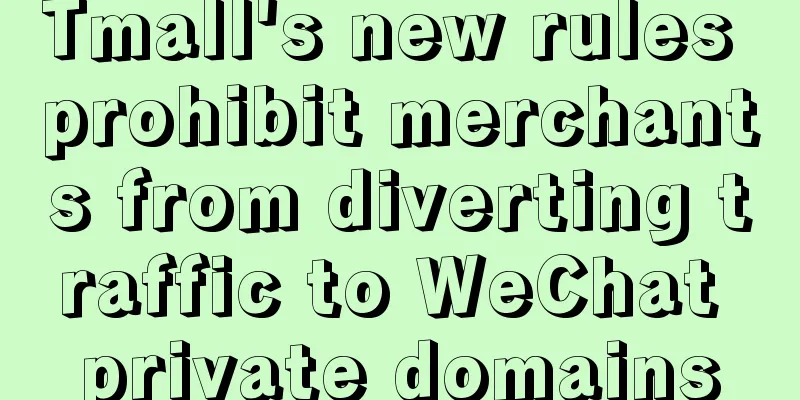Tmall's new rules prohibit merchants from diverting traffic to WeChat private domains

Tmall’s new regulations prohibit the use of package cards to divert traffic to WeChat. Merchants need to adjust their strategies to cope with the situation, and the platform may strengthen the protection of private domain traffic.Tmall recently made a new adjustment to a "rule of inducing third parties", which explicitly prohibits merchants from diverting package cards to other platforms. Although it did not specify which platforms, many examples in its other explanatory document revealed the logo, especially hinting at the behavior of diverting traffic to WeChat. According to the public announcement of the new rules, the new adjustment will officially take effect on July 1. Once merchants are found to have such behavior, they will face severe penalties, including product removal, point deduction, and even withdrawal. The new adjustment may bring new challenges to merchants' marketing. Some brands feel "not very optimistic" about this, while some brands feel that such measures "will come sooner or later." 1. Merchants are explicitly prohibited from using WeChat to divert traffic through package cardsPreviously, Taobao and Tmall had issued announcements many times prohibiting merchants from engaging in third-party inducement behavior. For example, it has been clearly prohibited for merchants to publish or push third-party products or information that may lead to transaction risks on store pages, product pages, promotion pages, Wangwang, and live broadcasts where they interact with consumers. But this new adjustment clearly adds offline parcel cards. The new adjustment clearly states that "merchants shall not induce consumers to jump to third-party websites or clients through methods such as package cards." In the accompanying picture of "Prohibiting the inclusion of third-party platform information in physical packages", the "WeChat" logo was revealed, which almost explicitly prohibits diverting traffic to WeChat's private domain. (Image source: Qianniu Headlines - Tmall Rules - Screenshot) The implementation of the new regulations means that merchants’ previous private domain traffic-inducing practices through parcel cards will no longer be allowed. Merchants who violate the rules to varying degrees will also be subject to severe penalties. For example, for minor violations, the relevant products will be removed from the shelves for the first time and a penalty of 2,000 yuan will be imposed; for serious violations, in addition to paying the penalty, the merchant will also be deducted 12 points; and for particularly serious violations, the relevant merchants will be directly expelled. At the same time, the announcement also reminded businesses to complete self-inspection before June 30 to avoid violations. 2. The new rules make some brands feel uneasyAfter seeing the new regulations, many brands in the Jianshi member group expressed surprise. Some brands said that they have always placed package cards in Tmall products, but they will stop this practice after the new regulations. Some brands have also lamented that things are not optimistic. You know, package cards are still a very important link in the brand's private domain traffic. Brands usually spend money on advertising in the public domain to get the user's first order, then direct the user to the private domain through package cards, and then carry out operations to increase subsequent repurchases. This has long been a mature gameplay, which plays a key role in improving ROI and reducing overall marketing costs. Therefore, in the past, the fan-adding rate and conversion rate of package cards have also become important indicators for many brands to evaluate their e-commerce performance. How to design package card content to improve the fan-adding rate and conversion rate is also an important topic for many brands to discuss. However, the implementation of the new regulations will be a blow to many e-commerce practitioners, meaning that they will lose a public channel to attract users, and will also lose a way to establish connections with users, provide services, and increase repeat purchases. It will be a fatal blow especially to those merchants who rely heavily on "package cards" to divert traffic in the private domain. They may lose new private domain users due to the new regulations. Some brands told Jianshi that after Tmall’s package card channel was cut off, there was almost no chance of attracting traffic through package cards, because platforms such as Douyin and Pinduoduo had already banned this behavior. Of course, the ensuing impact may not only be on the brand, but also on the related operating service providers who may be hit hard. 3. Alibaba starts a defensive battleRegarding the new regulations of the platform, some merchants said that they had been mentally prepared and believed that this was expected. Taobao has previously issued a clear ban on "inducing third parties", and it is only a matter of time before package cards are banned from diverting traffic. Perhaps the platform will catch some typical cases in the future. Some service providers in the Jianshi member group also said that prohibiting the diversion of private domains is a consistent practice of the platform, but the intensity of control is different at different stages. Regarding the new regulations, it can be said that Taobao has shifted from its previous "turning a blind eye" to a "total ban", and the penalties are constantly increasing. This has also caused some people to worry: Will it "drive away" some businesses? After all, many businesses are just trying to divert traffic to private domains. Of course, the announcement also mentioned the reasons behind the release of the new regulations, which is to prohibit behaviors that "may harass consumers, affect consumer transaction security, and otherwise harm the legitimate rights and interests of consumers" in order to protect the rights and interests of consumers. However, in the context of the increasing platform traffic, it is hard not to think that this is Alibaba’s own battle to defend its traffic. Some people say that this is a battle for Alibaba to protect its traffic. The introduction of the new regulations is a kind of protection for the platform's traffic. Although global user operations based on different platforms are now mainstream, where to store users (the main battlefield for private domain user operations) is still a key issue. Currently, most of the answers point to WeChat (including enterprise WeChat). This is also the reason why the industry has mentioned many times in the past that WeChat is the foundation for most companies to operate private domains. Therefore, from the industry's perspective, Tmall's new regulations to prevent traffic diversion may not be the focus. The key is whether a subsequent series of policies, tools and systems will be launched to compete to become the foundation of private domain operations. For brand merchants, in addition to responding to the platform’s call, they also need to readjust their traffic strategies. In addition, relying solely on a single means of traffic generation is very risky. We need to explore more diverse and compliant marketing methods to find new ways out. Author: See the truth Source: WeChat public account: "Jianshi (ID: jianshishijie)" |
Recommend
How to print Shopee logo card? How to operate?
Speaking of Shopee e-commerce platform, I believe ...
What should I do if my Amazon store is linked? What does it mean when a store is linked?
When you open a store on Amazon, if you find that ...
Even in the worst of times, there will always be excellent companies | Interview with marketing expert Zhou Hongqi
Marketing changes in the new era are surging. From...
"Marrying a rich woman in the Middle East" sparked controversy, and transnational couple bloggers are being backfired by traffic
In the wave of globalization, transnational couple...
How to use the mobile payment virtual card? What are the rules of use?
With the rapid development of technology, mobile p...
Unveiling the secrets of leveraging marketing: value benefits, six common methods, and the "three degrees" that need to be paid attention to
In the brand communication strategy, leverage mark...
What are the fees for individual cross-border e-commerce? How can individuals do cross-border e-commerce?
With the rapid development of cross-border e-comme...
Should I use an individual or corporate account for Amazon payment collection? Can it be a non-legal person account?
Whether the Amazon payment account is used by an i...
Is being a “nanny” to AI the way out for people like Tianya?
Tianya, a long-established Chinese community, has ...
A Preliminary Study on the Application of ChatGPT in Content Operation
The author of this article discusses the specific ...
How can a newly opened medical clinic or health care center attract offline customers?
Newly opened medical clinics or health clubs face ...
“Double 12” has ended and “Good Price Festival” has begun, what is Taotian thinking?
Taobao announced that it will no longer hold the D...
Looking at 618, the five major platforms’ gameplay preview
This article summarizes the 618 promotion trends a...
How is the webmoney fee calculated? Calculation method introduction
If you want to buy something on a cross-border e-c...
How to avoid being tricked by the e-commerce platform’s 618 pricing?
I didn’t expect that the “routines” of the 618 act...









